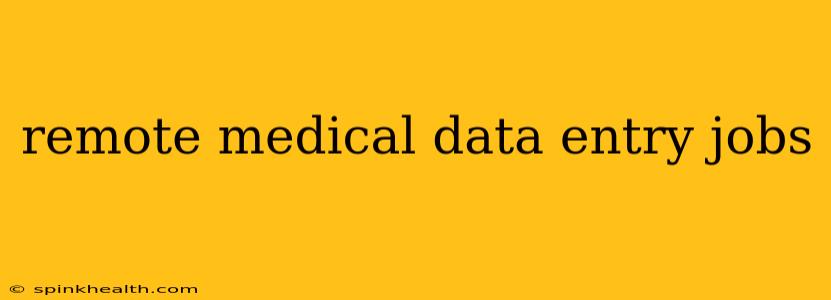The hum of the computer, the quiet click of the keyboard – this could be the soundtrack to your new career. The demand for remote medical data entry jobs is booming, offering a flexible and rewarding path for those seeking work-from-home opportunities. But what exactly does this career entail, and how can you find the perfect role for you? Let's dive in.
This isn't just about typing numbers; it's about contributing to the crucial flow of healthcare information. Imagine playing a vital role in patient care, all from the comfort of your home office. This is the reality for many medical data entry professionals.
What Does a Remote Medical Data Entry Specialist Do?
A remote medical data entry specialist is responsible for accurately and efficiently inputting medical information into electronic health records (EHRs) and other databases. This data can include patient demographics, diagnoses, treatment plans, test results, and insurance information. Accuracy is paramount, as incorrect data can have serious consequences. Think of it as being a meticulous curator of vital healthcare information.
One day you might be working on updating patient records, the next you could be verifying insurance details or coding medical procedures. The work is varied and often requires attention to detail and a good understanding of medical terminology.
What Skills Do I Need for Remote Medical Data Entry Jobs?
You don't need a medical degree, but a few key skills are essential:
- Typing Skills: Fast and accurate typing is a must. Think 60 words per minute or more.
- Attention to Detail: Medical data entry requires precision. One wrong digit can drastically change the meaning of information.
- Medical Terminology: Familiarity with common medical terms and abbreviations will significantly speed up your workflow and reduce errors.
- Computer Proficiency: You'll be working with various software programs, so strong computer skills are essential.
- Data Entry Software Familiarity: Experience with EHR systems or other medical data entry software is a significant advantage.
- Confidentiality: You'll be handling sensitive patient information, so the ability to maintain strict confidentiality is crucial.
What are the Requirements for Remote Medical Data Entry Positions?
While specific requirements vary by company and role, most employers look for:
- High School Diploma or Equivalent: This is usually the minimum educational requirement.
- Proven Data Entry Experience: Prior experience, even in a non-medical setting, can be highly beneficial.
- Background Check: Many employers conduct thorough background checks to ensure the security of patient data.
How Much Can I Earn as a Remote Medical Data Entry Specialist?
The salary for a remote medical data entry specialist varies based on location, experience, and the employer. However, you can expect a competitive wage, especially with experience and specialized skills. The opportunity to negotiate salary based on your skillset and experience can also significantly impact your earnings.
How Can I Find Remote Medical Data Entry Jobs?
The internet is your best friend! Several resources can help you find the perfect role:
- Job Boards: Websites like Indeed, LinkedIn, and Monster frequently post remote medical data entry jobs.
- Company Websites: Check the career pages of healthcare organizations and medical billing companies.
- Freelance Platforms: Platforms like Upwork and Fiverr sometimes offer medical data entry gigs.
What are the Pros and Cons of Remote Medical Data Entry Jobs?
Pros:
- Flexibility: Set your own hours and work from anywhere with a reliable internet connection.
- Work-Life Balance: Enjoy a better work-life balance compared to traditional office jobs.
- Remote Work Opportunities: Ideal for those who prefer working from home or have mobility limitations.
- Stable Employment: The demand for medical data entry specialists remains consistent.
Cons:
- Sedentary Lifestyle: The job is mostly sedentary, so it's essential to incorporate regular physical activity.
- Potential for Repetitive Strain Injuries: Prolonged typing can lead to repetitive strain injuries, so proper ergonomics are crucial.
- Data Entry Errors: Errors can have serious consequences, so high levels of accuracy and attention to detail are essential.
Is Medical Data Entry a Good Career Path?
For many, yes! The field offers flexibility, remote work opportunities, and a stable job market. However, it’s crucial to assess your skills and preferences to determine if it's the right fit for you. If you're detail-oriented, possess strong typing skills, and value flexibility, then a career in remote medical data entry could be the perfect pathway to a fulfilling and rewarding career.

